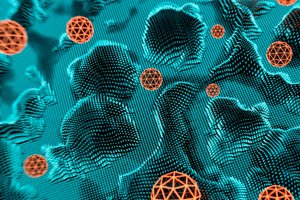
All iLive content is medically reviewed or fact checked to ensure as much factual accuracy as possible.
We have strict sourcing guidelines and only link to reputable media sites, academic research institutions and, whenever possible, medically peer reviewed studies. Note that the numbers in parentheses ([1], [2], etc.) are clickable links to these studies.
If you feel that any of our content is inaccurate, out-of-date, or otherwise questionable, please select it and press Ctrl + Enter.
EGCG Nanoparticles from Tea Restore Gut and Mental Balance in Colitis
Last reviewed: 09.08.2025

Scientists from Sichuan Agricultural University and the University of British Columbia have developed bioinspired tea protein nanoparticles (TSPs) that can reliably transport and release (-)-epigallocatechin-3-gallate (EGCG), a key polyphenol in green tea, into the intestines, thereby not only reducing inflammation in colitis, but also alleviating anxiety and depression in mice with the condition. The study is published in the journal Theranostics.
The EGCG Problem
(-)-Epigallocatechin-3-gallate (EGCG) is known for its strong antioxidant and anti-inflammatory properties, but it is quickly broken down in the gastrointestinal tract and is poorly absorbed.
Creating "tea nanocouriers"
- Source material: tea extract residue after tea production (tea meal) is rich in proteins (TProtein).
- Spontaneous assembly: In physiological buffer, TProtein was mixed with EGCG at slightly acidic pH, resulting in self-assembly of 100–120 nm diameter nanoparticles without any organic solvents or chemical binders.
- Characterization:
- DLS and TEM confirmed the narrow size distribution and spherical shape.
- FTIR and DSC showed that EGCG was encapsulated in a protein matrix and was stable at 37°C and pH 2–8.
- High loading: up to 25% of the mass of nanoparticles is EGCG.
Protection and delivery
- Stomach Stability: TSPs reduce EGCG oxidation by 30% at low pH while maintaining its activity.
- Mucosal penetration: The negative charge and size <200 nm allow the nanoparticles to penetrate the inflamed colon lining.
Controlled release in the intestine
- pH dependence: At pH 7.4 (intestine), up to 80% of EGCG was released from TSPs within 12 h, whereas at pH 2 (stomach) the degradation was less than 20%, protecting the polyphenol from degradation.
- Oxidation protection: in an acidic environment, free EGCG lost activity after 2 hours, while in TSPs it retained >70% of its antioxidant potential.
Preclinical model of colitis
- Induction of colitis: Mice were treated with 2% DSS in drinking water for 7 days.
- Treatment: either free EGCG (25 mg/kg), equimolar EGCG in TSPs, empty TSPs, or saline were given orally.
- Ratings:
- DAI (Disease Activity Index): a combined index of weight, stool and blood in the stool.
- Histology: H&E staining and ZO-1/occludin immunofluorescence.
- Cytokines: ELISA for TNF-α, IL-6 in colon tissue.
Results: Colitis and the intestinal barrier
- DAI was reduced by 70% in the TSPs + EGCG group versus 45% with free EGCG.
- Epithelial integrity was restored: ZO-1 and occludin expression in crypts was 60% higher than in controls.
- Inflammation is suppressed: TNF-α and IL-6 fell to levels not observed in colitis controls, while free EGCG showed only a partial reduction.
Impact on microbiota and brain
- Microbiota:
- α-diversity was restored to near baseline levels by TSPs + EGCG;
- The growth of SCFA producers (Lachnospiraceae, Ruminococcaceae) supported metabolic and anti-inflammatory effects.
- Gut-brain axis:
- Systemic reduction of LPS in the blood reduced the permeability of the blood-brain barrier.
- Mice with colitis typically showed anxious (↑time at walls in the open field test) and depressive (↑immobilization period in the forced swim test) behavior.
- TSPs + EGCG normalized these parameters: anxiety and depression returned to the level of healthy mice.
Authors' statements
“We were inspired by the natural combination of proteins and polyphenols in tea leaves and created a system that delivers EGCG exactly where it’s needed – the inflamed gut – with the added bonus of improving mood via the microbiota-gut-brain axis,” says Dr. Guo Junling.
The authors emphasize several key points:
Bio-inspired and natural approach
“Using tea proteins from plant raw materials makes our system as biocompatible and environmentally friendly as possible,” says Dr. Guo Junling. “We simply recreated natural tea complexes at the nanoscale, preserving their functionality.”Dual Therapeutic Effect
“We are particularly interested in the fact that TSPs + EGCG not only relieves inflammation in the gut, but also normalizes behavioral indicators of anxiety and depression,” notes Prof. Li Xiaojun. “This confirms the importance of the gut-brain axis in the pathogenesis of IBD.”Prospects for clinical translation
“The results in mice look promising, but we need to evaluate the pharmacokinetics and safety of TSPs in humans,” adds Dr. Sarah Chen of the University of British Columbia. “We are planning phase I clinical trials as early as next year.”A Comprehensive Recovery Strategy
“Our goal is to create a supplement that simultaneously strengthens the gut barrier, modulates the microbiota, and improves patients’ mood,” summarizes Dr. Zhang Wei. “With TSPs, this is becoming a reality.”
Prospects
- New Nutraceutical: TSPs May Become a Safe Dietary Supplement for IBD Patients
- Psychobiotics: Combination of anti-inflammatory and anxiolytic effects opens a niche for the treatment of "gut-brain" disorders.
- Clinical trials: Next steps include assessing the safety and pharmacokinetics of TSPs in healthy volunteers and patients with mild Ulcerative Colitis.
This natural-bio-inspired approach promises a comprehensive therapy for IBD that combines mucosal protection, microbiotic regulation and improvement of psycho-emotional state.
